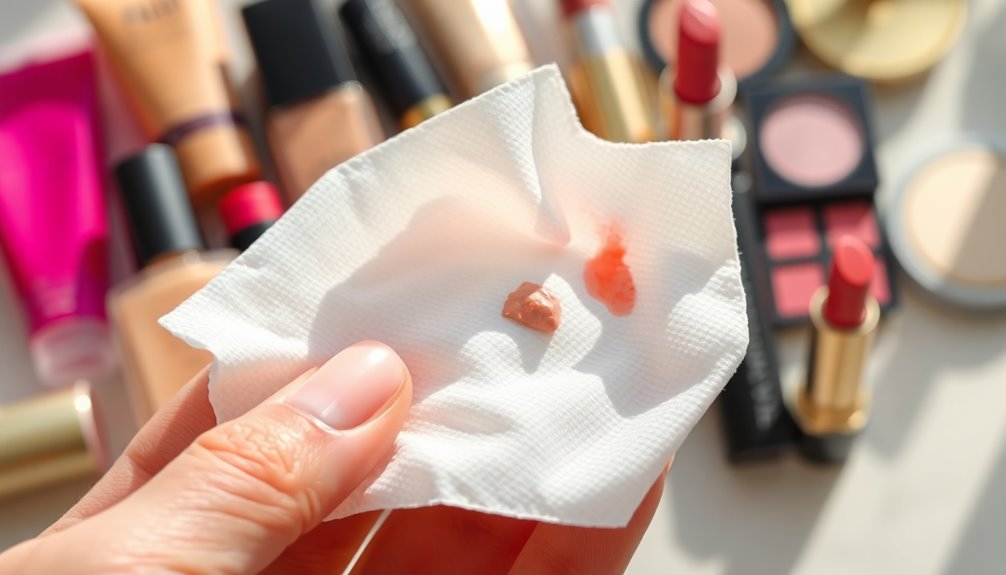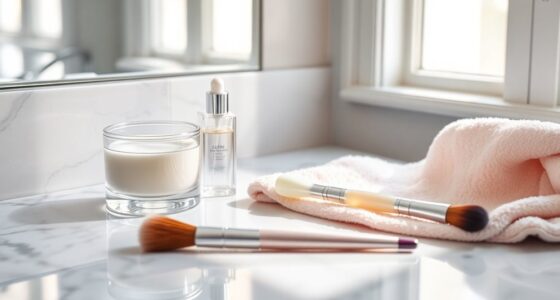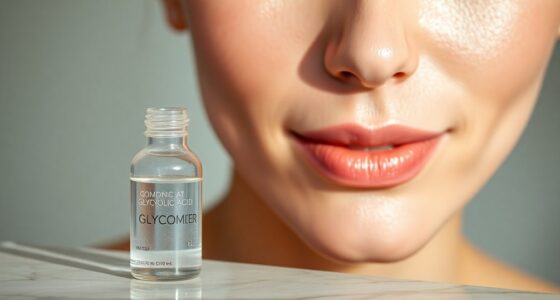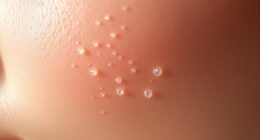Makeup wipes don't really remove all your makeup effectively. They often leave behind residue, which can clog pores and irritate your skin. The rubbing action may also cause sensitivity, especially around your eyes. Dermatologists suggest using wipes as a first step in a double cleansing routine, but it's better to follow up with a water-based cleanser for complete removal. If you want to know more about better alternatives and cleaning routines, there's plenty to discover.
Key Takeaways
- Makeup wipes often leave residue, which can lead to clogged pores and breakouts.
- They may not effectively remove all makeup, especially stubborn products like waterproof mascara.
- The rubbing action of wipes can irritate sensitive skin, particularly around the eyes.
- Dermatologists recommend using wipes as the first step in a double cleansing routine for better results.
- Water-based cleansers are generally more effective for complete makeup and impurity removal.
The Effectiveness of Makeup Wipes in Makeup Removal

While makeup wipes can seem convenient for quick makeup removal, their effectiveness is often questionable. Many users find that makeup wipes aren't effective at removing all makeup and impurities, leaving behind residue that can lead to clogged pores and various skin concerns. Additionally, using eye patches can be beneficial in hydrating and soothing the skin around the eyes after makeup removal.
The rubbing action required to use these wipes may irritate your skin, especially around sensitive areas like the eyes, causing redness and inflammation. Dermatologists recommend that you shouldn't rely solely on makeup wipes; instead, they suggest using them as the first step in a double cleanse, followed by a traditional cleanser. Additionally, it's important to ensure that you avoid ingestion of essential oils unless under professional guidance, as some ingredients in makeup products may have similar precautions.
Studies show that water-based cleansers are markedly more effective at thoroughly cleansing your skin, making them a better choice for maintaining healthy skin.
Common Ingredients in Makeup Wipes and Their Impact

Makeup wipes may seem like a quick fix for removing makeup, but the ingredients they contain can greatly impact your skin's health. Many wipes include preservatives like parabens and fragrances, which can cause irritation or allergic reactions. They're often made with synthetic fibers, contributing to environmental waste. Additionally, the rise in popularity of clean beauty has led consumers to seek alternatives that are gentler on the skin.
Here's a breakdown:
| Ingredient | Impact on Skin | Concerns |
|---|---|---|
| Parabens | Potential irritation | Allergic reactions |
| Fragrances | Skin sensitivity | Increased irritation |
| Sodium Lauryl Sulfate (SLS) | Strips natural oils | Dryness, barrier disruption |
| Synthetic Fibers | Non-biodegradable | Environmental pollution |
These ingredients might leave residues that can clog pores, leading to breakouts, making makeup wipes less effective for thorough cleansing. Additionally, frequent use of wipes may disrupt your skin's natural oil balance, resulting in further skin issues.
The Importance of a Complete Cleansing Routine

To maintain healthy skin, it's crucial to adopt a complete cleansing routine that goes beyond just using makeup wipes.
Relying solely on wipes can lead to dry skin and irritation, as they often leave behind residue. A thorough cleansing routine guarantees all impurities are removed, promoting skin health. Regularly checking and replacing HEPA filters in your air purifier can also help improve air quality, which is beneficial for your skin.
Relying only on wipes may cause dryness and irritation, as they often leave residue that harms skin health.
Consider incorporating these steps:
- Start with makeup wipes or an oil cleanser to remove makeup.
- Follow up with a gentle facial cleanser for deeper cleaning.
- Rinse thoroughly with water to eliminate any remaining residue.
- Use double cleansing for best results, especially for heavy makeup.
- Protect your skin barrier by choosing products that suit your skin type.
This extensive approach reduces the risk of breakouts and enhances your skin's overall appearance. Additionally, incorporating products with glycolic acid can further improve skin texture and tone, ensuring a smoother complexion.
Alternatives to Makeup Wipes for Better Skin Health

If you're looking for better skin health, consider alternatives to makeup wipes that can effectively cleanse without leaving residue.
Micellar water is a fantastic option; it hydrates while removing makeup and impurities. Cleansing balms provide a deeper clean, easily dissolving stubborn makeup and benefiting your skin's overall health. Regular use of glycolic acid products can also enhance your skin texture and radiance.
Pair them with reusable cotton pads for an eco-friendly and more absorbent solution. You can also use a damp towel with cleansing balm to enhance your makeup removal routine, ensuring all impurities are eliminated without irritation.
Finally, switching to traditional water-based cleansers after your initial makeup removal can help prevent clogged pores, improving your skin health and keeping it fresh and radiant. Additionally, incorporating products with glycolic acid can promote cell turnover and enhance overall skin clarity.
Environmental Concerns Surrounding Makeup Wipes

While exploring alternatives for better skin health, it's important to contemplate the environmental impact of makeup wipes. These products often contain non-biodegradable materials, like plastic and synthetic fibers, which can take up to 100 years to decompose.
Consider the following concerns:
- Millions of pounds of single-use makeup wipes end up in landfills each year.
- Conventional wipes are neither recyclable nor compostable, posing issues for eco-conscious consumers.
- Non-biodegradable fibers contribute to ocean contamination, harming marine life.
- Even compostable wipes still add to single-use waste.
- The production process further strains environmental resources. Long-term economic costs associated with waste management and pollution exacerbate the environmental footprint of these products. Additionally, opting for sustainable alternatives can significantly reduce the overall waste generated by cosmetics.
Choosing sustainable options can help reduce your ecological footprint and promote healthier beauty practices.
Frequently Asked Questions
Do Makeup Wipes Actually Remove Makeup?
Makeup wipes can help you remove some of your makeup, but they often don't get everything off.
You might find that residue lingers, which can lead to clogged pores and skin irritation. The rubbing action can also just push dirt around instead of lifting it away.
To really cleanse your skin, consider using wipes as a first step, then follow up with a traditional cleanser for a deeper clean.
What Are the Disadvantages of Face Wipes?
Face wipes have several disadvantages. They often leave residue on your skin, which can clog pores and lead to breakouts.
The rubbing action can irritate your skin, especially around sensitive areas like your eyes. Many wipes contain harsh chemicals that might cause allergic reactions.
Plus, they're not environmentally friendly, taking about 100 years to decompose.
Dermatologists recommend using traditional cleansers instead, as they provide a more thorough and gentle cleanse for your skin.
How Do Dermatologists Recommend Removing Makeup?
Imagine a fresh morning, your skin glowing and clean.
Dermatologists recommend starting your makeup removal with an oil-based cleanser; it glides over your skin, dissolving stubborn makeup.
Follow that with a gentle water-based cleanser, washing away any residue.
This two-step method guarantees your skin feels fresh and free from impurities.
Remember to use soft motions, especially around your eyes, to avoid irritation.
Say goodbye to clogged pores and hello to healthy, radiant skin!
Can You Use Makeup Wipes on Private Parts?
You shouldn't use makeup wipes on private parts.
They're not designed for that sensitive skin and might contain fragrances or chemicals that can irritate.
These wipes can disrupt your natural pH balance, leading to discomfort or infections.
If you need to clean intimate areas, opt for products specifically formulated for that purpose.
They're gentler and safer, ensuring you maintain proper hygiene without risking irritation or other issues.
Prioritize your skin's health!
Conclusion
In the dance of makeup removal, makeup wipes might take the lead, but they often leave a few partners behind. While they provide a quick and convenient exit, they can miss stubborn traces and impurities. Think of them as a gentle curtain call, not the final bow. For a truly clean stage, consider a complete cleansing routine. Embrace alternatives that treat your skin with the care it deserves, and bid farewell to the environmental footprint of those single-use wipes.










